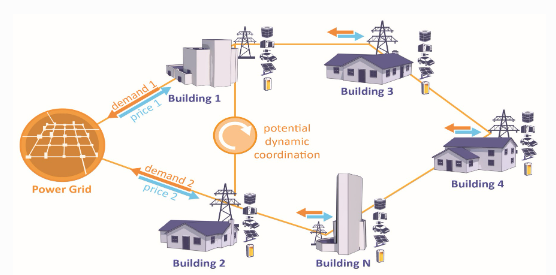CityLearn Chalenge 2023. Control Track.
CityLearn Challenge 2023. Using AI for Building's Energy Management.
Course of study:
Kind of thesis:
Programming languages:
Keywords:
Problem:
The CityLearn Challenge makes use of the CityLearn Gym environment as an opportunity to compete in investigating the potential of artificial intelligence (AI) and distributed control systems to tackle multiple problems within the built-environment domain. It is designed to attract a multidisciplinary participation audience including researchers, industry experts, sustainability enthusiasts and AI hobbyists as a means of crowd-sourcing solutions to these problems.
The CityLearn Challenge 2023 addresses this multi-faceted nature of advanced control in buildings by blending the challenges of control algorithm design, forecast quality and grid-resilience.
The CityLearn Challenge 2023 presents a control track as done in previous challenges as well as introduces an independent forecasting track where, both tracks are run in parallel and utilize the same dataset.
In the control track, participants will develop energy management agent(s) and an optional custom reward function (in RLC solutions) to manage electrical and domestic hot water energy storage systems, and heat pump power in a synthetic single-family neighborhood under normal grid-operation and power outages.
This project will focus on the control track of the above challenge.
In the control track, your objective is to design your own single-agent or multi-agent reinforcement learning control (RLC) policy. You can also opt to develop a custom reward function. This is targeted for electrical (battery) and domestic hot water storage systems, as well as heat pump control within buildings. The overarching goals are to ensure thermal comfort, decrease carbon emissions, enhance energy efficiency, and provide resilience during power outages.

Goal:
You are expected to grasp the problem, propose an RL agent, and refine the reward function. Your agent should demonstrate evidence of learning a beneficial policy. You are NOT expected to discover a policy that delivers outstanding performance due to the challenge’s difficulty. However, achieving this would be a significant bonus for your project!
Preliminary work:
The CityLearn Challenge 2022 also offered a control track. You can gain insights into last year’s solutions to build your own solution for this year. Additionally, the tutorial in [4] will provide you with a more hands-on understanding of the problem. The solution from last year’s winner can be found in [5], and a presentation featuring the top five teams is available in [6].
Tasks:
This project can include
The final tasks will be discussed with the supervisor. Please feel free to get in contact.
References
Supervision
Supervisor: Rafael Fernandes Cunha
Room: 5161.0438 (Bernoulliborg)
Email: r.f.cunha@rug.nl
Co-supervisor: Juan Diego Cardenal Cartagena
Email: j.d.cardenas.cartagena@rug.nl
